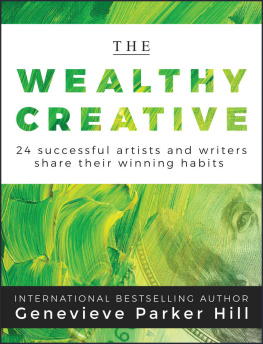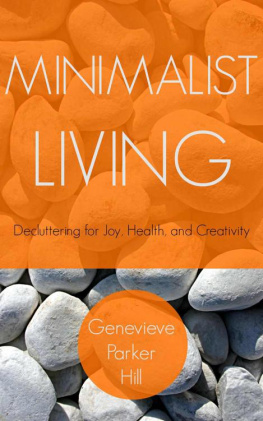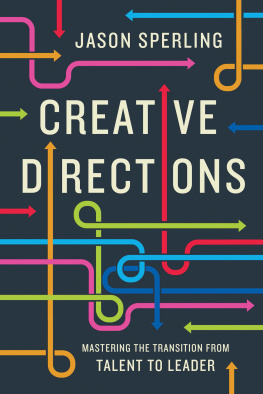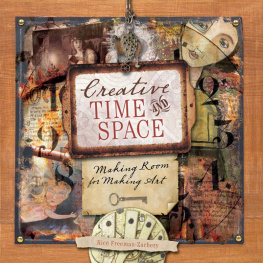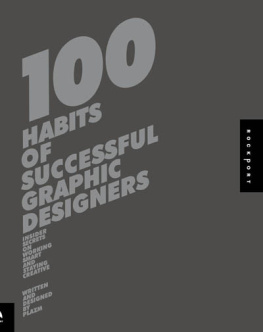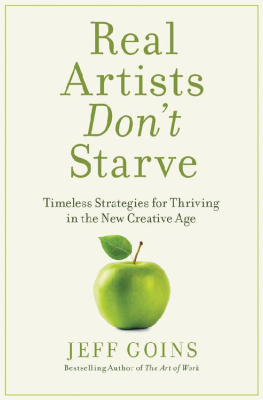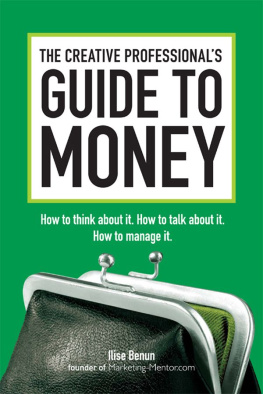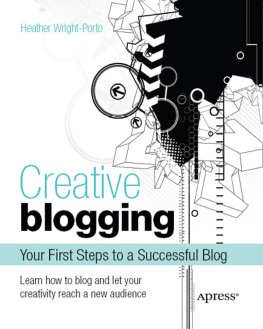The
Wealthy
Creative
24 Successful Artists and Writers share their winning habits
GENEVIEVE PARKER HILL
Copyrigh t 2017 Genevieve Parker Hill
All rights reserved.
No part of this book may be reproduced, stored in a retrieval system, or transmitted by any means, electronic, mechanical, photocopying, recording, or otherwise, without written permission from the copyright holder.
Quotations from the wealthy creative mentors (listed at end) come from interviews conducted by the author and used by permission of the person quoted.
For any inquiries related to this book, please contact the author by email: .
Table of Contents
Chapter One: How to Be a Wealthy Creative
Our goals can only be reached through a vehicle of a plan, in which we must fervently believe, and upon which we must vigorously act. There is no other route to success.
Pablo Picasso
After a phone call with a friend, I feel renewed and deeply grateful for a friendship with a creative person who inspires me with her art, honesty, and persistence. She is enjoying some career wins that include her voice reaching an ever-expanding audience. Another friend just emailed to share that a movie he wrote, directed, and stars in is now widely available for purchase. Thats another win to celebrate in my creative community. This is a rather unusual week for my creative friendsunusually upbeat, that is. The creative career path isnt always so exciting. Many times, creatives in my community feel discouraged, stuck, or uncertain how to move forward. What is the next right step? they ask themselves. They wonder if its time to quit and get a real job, or time to do whatever plan B was. Or maybe they have a real job already and are wondering at what point they should quit and do what they are passionate about. How much money to save? How much money should they make from the creative gig before they are assured success and can quit the other thing? And then there are the deeper fears, like, is this creative work really making a difference? And, what would I do if the creative well dried up, or if I came to dislike or actively hate this work? Then there are the questions success brings, questions like, what if I want to completely change what I am doing? Will I still have a career or will I lose everything Ive worked so hard to build?
These questions, Ive learned, are normal. Almost every creative person I can think of (and Im privileged to know many) has doubts, fears, and insecurities. The questions they ask themselvesand their answersarent particularly malevolent, but feeling stuck between the questions and the answers can cause harm, because it stops all forward motion.
Forward Motion
This is a book about moving forward; its a book meant to inspire the next step that is right for you. And the one after that. And so on. As a young teenager, I read The Seven Habits of Highly Effective Teenagers, by Sean Covey. It sparked a lifelong love for the personal development genre, as well as a lasting respect for the power of habits. Noticing and tweaking my habits has helped me in so many ways, and it may have even saved my life at a time when I needed hope that one day my depression would end.
We all go through difficult times, times of anxiety, grief, or stress. There's a saving grace in the ability to take the next step, to put one foot in front of the other in the right direction, until doing so becomes a habit that effortlessly leads us where we want to go. Choosing healthy habits is about making sure those steps we take are consistently moving us in the right direction. For a creative person, that means building habits that help us become and stay healthy, productive, and prosperous.
Defining the Wealthy Creative
To be a wealthy creative is to have a career you love making things that matter to you. Its definition is whatever is the opposite of soul-crushing job. There is no line between a wealthy creatives job and his or her life. When youre a wealthy creative, your work feels deeply personalit means something to you, and it means something for the hundreds, thousands, or perhaps millions of people it reaches. Your work has something of the sense of play you found as a child in making things, playing games, performing, exploring, or imagining. You do not separate yourself as a creator from yourself as a channel, an introducer, a connector.
You are neither too proud nor too humble to promote your own work. You believe in your works power to move people, to help them, to awaken some recognition in them and you are not ashamed of it. You understand that your work isnt for everyone, but it is for someonenamely yourself and anyone else who is drawn to what youre exploring. When your work is criticized, it hurts, and when your work is praised, it feels good. However, you understand that you are not your work, so you don't take praise or criticism personally. You know that what people say about your work doesnt change your identity. You keep moving forward, toward the work that explores the questions that keep you awake at night. You keep making things. You know that to keep creating, at some point your creative work will need to help fund your life, and you feel peaceful and proud about pursuing abundant income from your creative work so that you dont have to turn to work that crushes your soul.
This Books Journey
Back in 2006, I became very interested in the language around creative careers because I noticed that many of my friends who were creative, who were artists, writers, designers, photographers, and musicians, were being encouraged to have a backup plan. This isn't something new, but something we're often told: creative careers are unstable and highly competitive and you need to have a skill to fall back on . There are many reasons we tell people this, but I think there are two main reasons.
The first reason is that in our society, we need to earn money. We need to pay each other for things that we need. And art, books, designs, photographs, and music aren't always considered needs in the sense that food and shelter are. Of course, art can meet a variety of needs, so that reason isn't very relevant.
The second reason, and this is the hairier one, the harder-to-confront one, is that a creative career is infamous for being one in which you must be a self-starter, entrepreneurial, highly persistent, and self-motivated. And maybe other things, too: highly organized, perhaps, systematic, methodical. These characteristics are not always things we associate with the most creative, artistic members of our society. But wealthy creatives can wear all these hats while feeling wholeheartedlike one person, not someone with a divided soul.
Through the years, I stayed interested in the creative people around me. I stayed curious about my friends who were going out into the job market, who were creating work for themselves, or taking work for other people. I wondered about what they were doing, and whether it was something that fulfilled them creatively. Was it something they loved and felt passionate about in the same way they had deeply enjoyed making things during our time together as students? I watched not only these friends but other creatives and artists around me.
I became very interested in what it took to make a living from art because it seemed to be an uneven and at times invisible path.
I continued to informally research my question of "how do artists make a living? That question was brought up offhandedly by one of my college professors whod started several successful businesses before going into academia. He mentioned that many years ago, he had started a very successful chain of art galleries. This was the culmination of a long entrepreneurial quest to help one artist he knew make a living doing what she loved.
Next page
